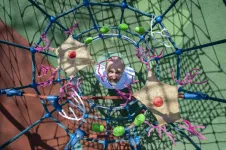(Press-News.org) A new study led by researchers at Johns Hopkins and the University of Pennsylvania uses computer modeling to suggest that eviction bans authorized during the COVID-19 pandemic reduced the infection rate and not only protected those who would have lost their housing but also entire communities from the spread of infections.
With widespread job loss in the U.S. during the pandemic, many state and local governments temporarily halted evictions last spring, and just as these protections were about to expire in September, the Centers for Disease Control and Prevention (CDC) declared a national eviction ban.
However, the order is only extended a few months at a time and is under constant challenge in the court system, including debates about whether such measures control infection transmission.
The research team aimed to study if eviction bans help control the spread of SARS-CoV-2, the virus that causes COVID-19, explains Alison Hill, Ph.D., an assistant professor of biomedical engineering at Johns Hopkins.
In a bid to document the potential impact, Hill and Michael Levy, Ph.D., of the University of Pennsylvania, teamed up with experts in housing policy from the University of Illinois Urbana-Champaign. Hill and Levy specialize in using mathematical models to study how infections spread.
A report on the research was published April 15 in Nature Communications.
In the new report, the investigators say they used simulations to predict the number of additional SARS-CoV-2 infections in major U.S. cities if evictions had been allowed to occur during the fall of last year.
They estimated, for example, that in a city of approximately 1 million residents with evictions occurring at a heightened rate of 1% of households per month, an additional 4% of the population could become infected with SARS-CoV-2, which corresponds to about 40,000 more cases. Even with a much lower eviction rate of 0.25% per month, which is similar to the pre-pandemic level in cities such as Atlanta, Detroit and Tucson, Arizona, estimates were for about 5,000 additional cases.
To make these predictions, the researchers first calibrated their math model to re-create the most common epidemic patterns seen in major U.S. cities in 2020. The model took into account changes in infection rates over time due to public health measures, and it was tailored to match reported COVID-19 cases and deaths. The researchers used the model to track the spread of infection in and out of households. Then, they ran another version of the model in which eviction bans were lifted, to estimate how the bans have affected transmission of the virus.
Hill and her colleagues found that without eviction bans, people who are evicted or who live in a household that hosts evictees have 1.5 to 2.5 times more risk of being infected with SARS-CoV-2 than if the eviction bans were in place.
"People who experience eviction often move in with other households, increasing the density of people living together," says Hill. "Households are known to be an important setting for SARS-CoV-2 infection, so this can increase transmission rates."
The researchers' computer simulations also found that without eviction bans, the risk of SARS-CoV-2 infection would rise for all residents of a city, not just those who are evicted.
Even when the researchers evaluated a different version of the model, in which a city is divided into neighborhoods of different socioeconomic status and evictions are restricted to certain districts, evictions still could cause increases in infections with the virus.
"Some opponents of eviction bans say that evictions only affect a narrow part of the population, but our simulations indicate that evictions not only put disadvantaged households at risk of infection, but entire communities as well," says Hill. "When it comes to a transmissible disease like COVID-19, no neighborhood is entirely isolated."
When the researchers used this data to examine how evictions would specifically impact Philadelphia residents, they found that people in all neighborhoods of the city would experience increased COVID-19 levels due to evictions.
Teaming up with researchers from Northeastern University who used de-identified information about how city residents travel throughout neighborhoods, the researchers estimated that, without eviction bans, there could have been approximately 5,000 more COVID-19 cases in Philadelphia if evictions occurred at pre-pandemic levels, and up to 50,000 additional cases if evictions were five times more frequent.
An early version of this research was cited in court cases challenging eviction bans in Philadelphia, and in the CDC's national eviction order (click here and here).
To alleviate infection risk and reduce economic burdens, the researchers say, governments should consider not only extended eviction bans but also financial assistance for both tenants and landlords, as well as resources for households to reduce transmission of the virus within the home.
INFORMATION:
Funding for the research was provided by the National Institutes of Health (DP5OD019851, R01AI146129), the CDC's COVID Supplement, Google Cloud and Google Cloud research credits.
In addition to Hill and Levy, researchers who contributed to the study include co-first authors Anjalika Nande from Harvard University and Justin Sheen from Princeton University; Andrei Gheorghe and Ben Adlam at Harvard University; Julianna Shinnick and Maria Florencia Tejeda at the University of Pennsylvania; Emma Walters, Andrew Greenlee and Daniel Schneider at the University of Illinois Urbana-Champaign; and Brennan Klein, Matteo Chinazzi, Samuel Scarpino and Alessandro Vespignani at Northeastern University.
Alzheimer's disease (AD) is a form of progressive dementia interfering with daily living. It is caused by the decline in the number of brain cells resulting in the deterioration of our mental abilities. One of the main reasons for the worsening brain cells condition and even the brain shrinkage are molecules having a specific structure called β-amyloids (Aβ). They are peptides that tend to agglomerate around the nerve cells, becoming toxic and damage them. Recent studies, presented by scientists from the Institute of Physical Chemistry, Polish Academy of Sciences, led by dr. Piotr Pieta, give hope for inhibition of the β-amyloids' toxicity by applying the K162 molecule. Researchers present a tremendous protective impact on the biological membranes ...
UPTON, NY--Scientists have identified the primary cause of failure in a state-of-the-art lithium-metal battery, of interest for long-range electric vehicles. Using high-energy x-rays, they followed the cycling-induced changes at thousands of different points across the battery and mapped the variations in performance. At each point, they used the x-ray data to calculate the amount of cathode material and its local state of charge. These findings, combined with complementary electrochemical measurements, enabled them to determine the dominant mechanism driving the loss of ...
A joint research carried out by MIPT scientists and Harvard researchers have presented retinal cells that can integrate into the retina. This is the first successful attempt to transplant ganglion cells (retinal neurons that are destroyed by glaucoma) derived from stem cells in a lab setting. Scientists tested the technology in mice and established that the cells successfully integrated and survived for a year. In the future, the researchers plan to create specialized cell banks, which will permit individual, tailored therapy for each patient.
The world's first successful attempt to grow and transplant ...
COVID-19 patients who are overweight or obese are more likely to develop a more severe infection than patients of healthy weight, and they require oxygen and invasive mechanical ventilation more often. There is no increased risk of death . These conclusions, for which more than 7,000 patients were studied, appear from international research in eleven countries, including the Netherlands (Radboud university medical center).
The study, led by Australian researchers, examined over 7000 patients from eleven different countries who were admitted to 18 hospitals. Of this group, over a third (34.8%) were overweight and almost a third (30.8%) were obese. COVID-19 patients with obesity required ...
Coral reefs are one of the most biologically diverse ecosystems on earth. In the northern Red Sea and Gulf of Aqaba corals also have exceptionally high tolerance to increasing seawater temperatures, now occurring as a consequence of global warming. This characteristic led coral reef scientists to designate this region as a potential coral reef refuge in the face of climate change - a reef where corals may survive longer than others that are being lost at an alarming rate due to human pressures.
However, global climate change will also result in more variable weather patterns, including extreme cold periods. Some researchers predict that the Red Sea region is entering a cooling phase. Therefore, researchers from Bar-Ilan University and ...
Making space in high street shops for people to repair clothes could mend the damage caused by fast fashion and transform sewing into a wellbeing activity, experts say.
More resources and opportunities for people to embrace slow fashion could also save people money, help them learn new skills and create new business opportunities.
A new study suggests a variety of ways in which consumers might be encouraged to change their clothing purchasing behaviour, depending on their personality traits. One way to do this might be by marketing making and mending expertise as the "hipster's' equivalent of a spa day".
Fast fashion has emerged in the last few decades as clothes have become cheaper, less durable and are purchased more frequently. This has resulted in severe negative environmental ...
WASHINGTON -- Researchers are blurring the lines between science and art by showing how a laser can be used to create artistic masterpieces in a way that mirrors classical paints and brushes. The new technique not only creates paint-like strokes of color on metal but also offers a way to change or erase colors.
"We developed a way to use a laser to create localized color on a metallic canvas using a technique that heats the metal to the point where it evaporates," said research team leader Vadim Veiko from ITMO University in Russia. "With this approach, an artist can create miniature art that conveys complex meaning not only through shape and color but also through various laser-induced microstructures on the ...
UNIVERSITY PARK, Pa. -- As vaccines that help protect against COVID-19 become available for more people across the United States, questions have been raised about whether institutions like schools and universities should require their students and staff to become vaccinated.
A new study by Simon Haeder, assistant professor of public policy at Penn State, found that a majority of those surveyed supported mandates that required students and teachers to be vaccinated against COVID-19. However, more people supported broader vaccine mandates that don't ...
OKLAHOMA CITY -- With an overall survival rate of 9% for those diagnosed, pancreatic cancer remains exceedingly difficult to treat. However, the patient's primary tumor typically isn't what leads to death - it is the cancer's ability to evade detection and metastasize to other organs.
A team of researchers at the OU College of Medicine has published a new study in the journal Gastroenterology, the world's leading publication on GI tract disease, that sheds new light on the ability of pancreatic cancer cells to spread throughout the body. Understanding why metastasis occurs is crucial for developing a therapeutic strategy to stop the spread.
The study, led by scientist ...
The composition of the street drugs heroin and cocaine has dramatically changed at alarming speeds across the globe. No longer are these street drugs cut with benign materials such as lactose but now cut with up to 17 or more pharmaceutically active and potentially toxic adulterants.
A drug user may buy cocaine today but end up with a drug cocktail more dangerous then what was bought and assumed was cocaine. This has a profound effect on public health and safety as well as on the individual street drug users during the COVID-19 pandemic.
Selected by the Editor-in-Chief, Dr. Kenneth Blum as the Editor's Choice in the May 2021 issue of Current Psychopharmacology (CPSP), this work examined the alarming addition of multiple pharmaceutically active substances collectively ...





